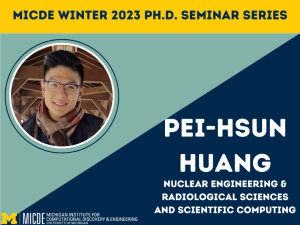Presented By: Michigan Institute for Computational Discovery and Engineering
MICDE Ph.D. Student Seminar: Pei-Hsun Huang
Pei-Hsun Huang, PhD Candidate, Nuclear Engineering & Radiological Sciences and Scientific Computing

Topic: Simulation for the Design of Sodium Heat Pipes bundle Test Facility for the Application of Microreactors
The 20 MW Special Purpose Reactor (SPR) is a heat pipe cooled microreactor that designed for electricity production in remote locations where reliable power grids are not always available. The key to SPR is the alkali metal heat pipes, which offer entirely passive operation capacity with high mobility. Prior to deployment, safety analysis with postulated accident scenarios is required for the licensing of SPR. To this regard, a sufficiently accurate model is crucial to predict the behavior of heat pipes, and high-resolution data is needed for the safety analysis of SPR. However, the current existing heat pipe models are either oversimplified or unpractical expensive in view of the difficulty of the simulation with the wick structure and two-phase flow in the heat pipe. Therefore, high fidelity experimental data is required for model verification in the high temperature heat pipe bundle system. The Michigan Sodium Heat Pipe bundle test facility which serves as a scale-down test facility using ten sodium heat pipes with a triangular array, was utilized to verify the model for the licensing of SPR. In the talk, the feasibility analysis using Computer Aided Engineering and Computational Fluid Dynamics for the design of the test facility was addressed.
The 20 MW Special Purpose Reactor (SPR) is a heat pipe cooled microreactor that designed for electricity production in remote locations where reliable power grids are not always available. The key to SPR is the alkali metal heat pipes, which offer entirely passive operation capacity with high mobility. Prior to deployment, safety analysis with postulated accident scenarios is required for the licensing of SPR. To this regard, a sufficiently accurate model is crucial to predict the behavior of heat pipes, and high-resolution data is needed for the safety analysis of SPR. However, the current existing heat pipe models are either oversimplified or unpractical expensive in view of the difficulty of the simulation with the wick structure and two-phase flow in the heat pipe. Therefore, high fidelity experimental data is required for model verification in the high temperature heat pipe bundle system. The Michigan Sodium Heat Pipe bundle test facility which serves as a scale-down test facility using ten sodium heat pipes with a triangular array, was utilized to verify the model for the licensing of SPR. In the talk, the feasibility analysis using Computer Aided Engineering and Computational Fluid Dynamics for the design of the test facility was addressed.